A hopping farm
New farm growing unique hops for area brewers
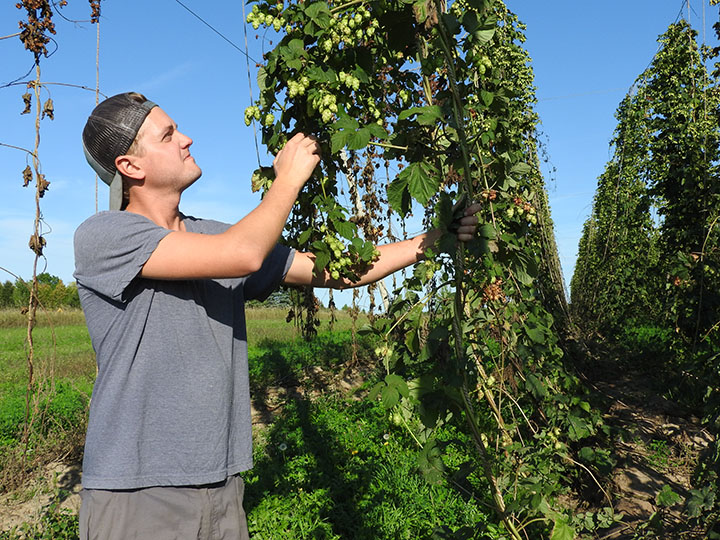
Andrew Walawender “scouts” the hops at his hopyard to see if they are ready to harvest. Walawender owns and operates 45th Parallel Hops in Hawks, the only hop farm currently operating in Northeast Michigan.
HAWKS — Four years ago, Andrew Walawender traded the big city for 20 acres in Posen so he could pursue his dream of starting his own farm.
Walawender, who owns and operates 45th Parallel Hops in Hawks, knew he wanted to grow specialty crops and attended a couple of conventions for apple growers and grape growers before he found and fell in love with hops.
“I wanted to do something different,” he said. “Historically, hops grow the best in a sandy loam soil and also where potatoes are grown. I knew Posen was a big potato-growing region, so I came here and drove by the farm.”
At the time, Walawender said the field was full of corn, with a for sale sign on it.
He called to inquire about the property and ended up owning it the next week. Because the property was just land, he had to erect the buildings there to process the hops and store his equipment.
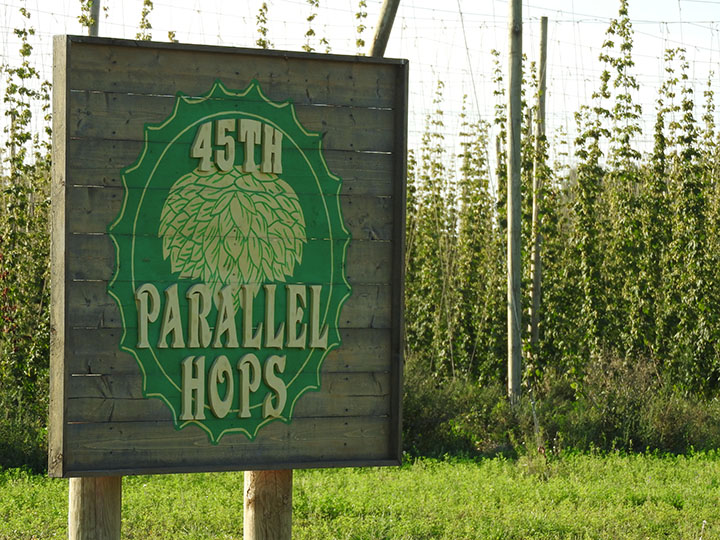
Located in Hawks, 45th Parallel Hops is the only hop farm operating in Northeast Michigan. Andrew Walawender, the farm’s owner and operator, said hops grow best on the 45th parallel around the world.
Walawender grows eight varieties of hops. He planted his first hopyard in 2015 and planted his second in 2018, which he anticipates being able to harvest next year.
He was selective in choosing the types of hops to grow in his field. While he grows some more common varieties, such as cascade and centennial, he also grows some lesser-known varieties, such as fuggle and hallertau.
Walawender also has connections with one of the largest hops growers in Poland, and is able to import the pellets. He recently received a 2,000-pound shipment of hops from the country.
“Brewers like them, because they’re different,” he said. “They’re not grown here. You can’t grow them here, and they make a different taste in beer. They’ve been really happy with that.”
Growing hops is a costly and intensive process, according to Walawender, who says the infrastructure costs him about $17,000 per acre to install. The most labor-intensive times in the hopyard are in the spring, when he has to set up the coconut coir strings for the hops to grow on, and in the fall, when the hops are harvested.
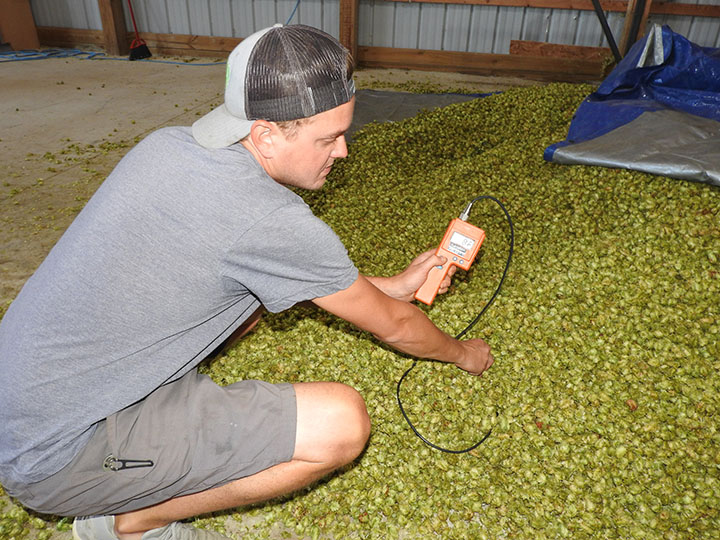
Andrew Walawender, who owns and operates 45 Parallel Hops in Hawks, checks the humidity of the hops after they’ve been dried.
Throughout the summer, Walawender scouts the field to maintain the bines, fertilizes them, and looks for pest damage. He said the hops grow quickly, averaging between 15 and 16 inches of growth each day. The hops bine grows up the coconut coir string by wrapping themselves around the string clockwise to follow the sun.
The hops are ready when the lupulin in the cone turns a golden color and is fragrant when rolled in between the palms of the hands. The hops bines are then cut down in the field and taken into the barn for processing.
“Each variety is ready to pick at a different time, which is nice, because we can stagger (the harvest), and everything doesn’t have to be done at once,” he said.
Walawender estimates he grows and harvests around 30,000 pounds of hops annually. When he is able to harvest from his second hopyard next year, he anticipates that number to double.
Walawender had to purchase his two processing machines from a manufacturer in Germany, which specializes in making them. The machines consist of a number of belts and rollers that separate the cones from the bine. A conveyor belt drops the cones into a crate and the waste exits the machine at another point.
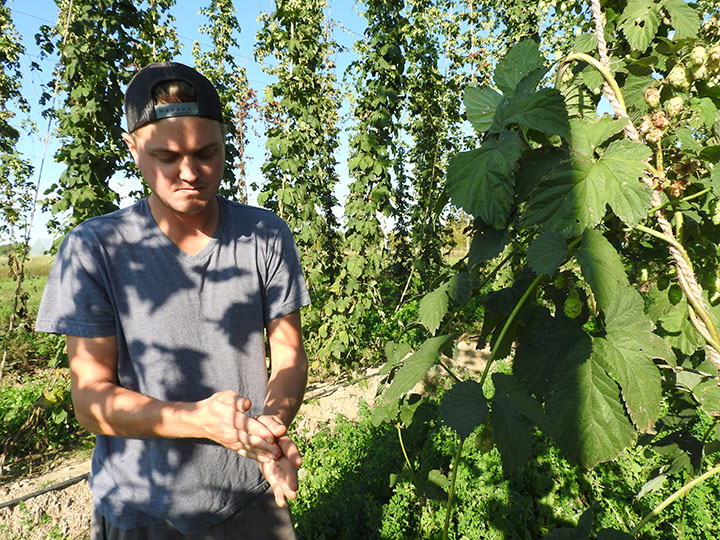
Andrew Walawender rolls a few hop cones in his hands to check whether they’re ready to harvest. Walawender looks for the lupulin, a fine dust produced inside the cones, to be a golden color and for the cones to be fragrant.
The hops are then dried and sent to Omena, where they’re turned into pellets and packaged into 11-pound bales. Walawender said turning the hops into pellets is the only part of the process that isn’t completed on the farm, simply because the equipment is too expensive.
Walawender sells his hops to about 40 different breweries throughout the Midwest and East Coast, as well to homebrewers via his website, 45parallelhops.com. Local businesses also source their hops from him.
“I work closely with Austin Brothers in Alpena,” he said. “They’re buddies and good people, and they like to support local farms.”
Walawender said he is still “fairly new in the hop game,” but that business is growing each year.
He said it helps that he grows and sells varieties other farmers don’t grow, because brewers seek him out for those varieties.
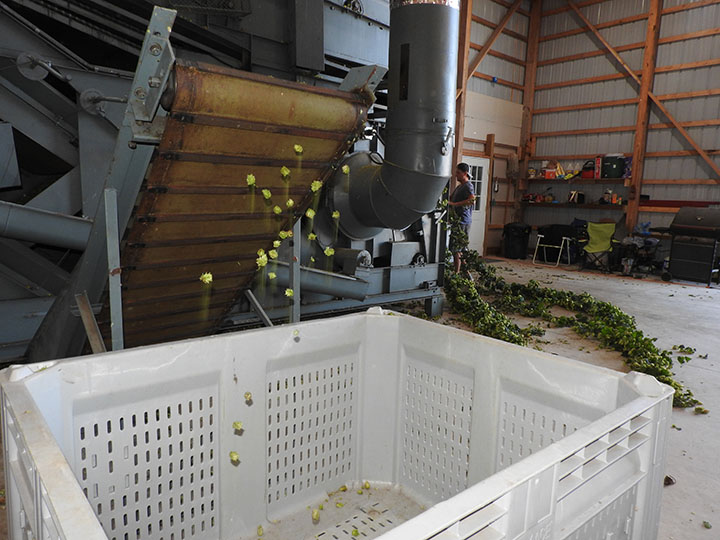
Hop cones, which have been separated from the hop bine, fall off the conveyor belt and into a crate, as they are being processed.
“I would like to expand, maybe in a few years, after I get everything here down to a science of what works for us,” he said. “Because we’re still figuring out best ways to harvest and just to cut time.”
Crystal Nelson can be reached at 989-358-5687 or cnelson@thealpenanews.com.
- Andrew Walawender “scouts” the hops at his hopyard to see if they are ready to harvest. Walawender owns and operates 45th Parallel Hops in Hawks, the only hop farm currently operating in Northeast Michigan.
- Located in Hawks, 45th Parallel Hops is the only hop farm operating in Northeast Michigan. Andrew Walawender, the farm’s owner and operator, said hops grow best on the 45th parallel around the world.
- Andrew Walawender, who owns and operates 45 Parallel Hops in Hawks, checks the humidity of the hops after they’ve been dried.
- Andrew Walawender rolls a few hop cones in his hands to check whether they’re ready to harvest. Walawender looks for the lupulin, a fine dust produced inside the cones, to be a golden color and for the cones to be fragrant.
- Hop cones, which have been separated from the hop bine, fall off the conveyor belt and into a crate, as they are being processed.
- Waste product from the processing is collected in crates and composted to be applied to the hopyard at a later date.
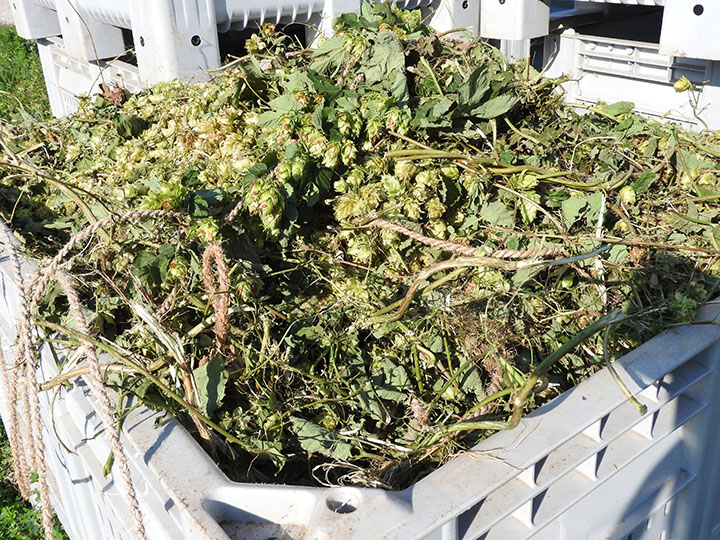
Waste product from the processing is collected in crates and composted to be applied to the hopyard at a later date.











